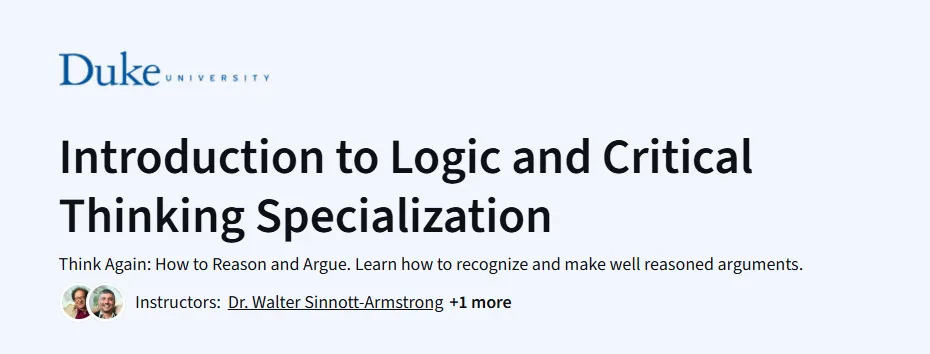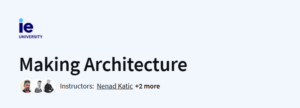What will you learn in Introduction to Logic and Critical Thinking Specialization Course
Develop analytical thinking to identify flawed reasoning and deceptive arguments.
Apply logical frameworks like deduction, induction, and argument structure.
Recognize common fallacies in everyday and academic contexts.
Evaluate evidence and construct valid, well-supported arguments.
Program Overview
Course 1: Think Again I: How to Understand Arguments
⏱️ 4 weeks
Topics: Recognizing arguments, premises vs conclusions, argument reconstruction.
Hands-on: Practice identifying arguments from everyday situations.
Course 2: Think Again II: How to Reason Deductively
⏱️ 4 weeks
Topics: Validity, truth tables, logic symbols, and deduction.
Hands-on: Construct and assess deductive arguments using logical notation.
Course 3: Think Again III: How to Reason Inductively
⏱️ 4 weeks
Topics: Inductive strength, analogical reasoning, generalizations, and causal arguments.
Hands-on: Apply statistical reasoning and assess probabilities.
Course 4: Think Again IV: How to Avoid Fallacies
⏱️ 4 weeks
Topics: Common fallacies (ad hominem, straw man, slippery slope), fallacy detection.
Hands-on: Analyze flawed arguments in media and discussions.
Get certificate
Job Outlook
Valuable in law, politics, academia, consulting, public speaking, and AI/tech.
Strong demand for professionals with analytical and logical reasoning skills.
Enhances academic writing, policy analysis, and debate abilities.
Useful for preparing for law school, GRE, or public policy roles.
Specification: Introduction to Logic and Critical Thinking Specialization
|
FAQs
- No prior philosophy or logic experience required.
- Covers argument structure, deduction, induction, and fallacies.
- Suitable for students, professionals, and anyone seeking critical thinking skills.
- Hands-on exercises to apply concepts to everyday reasoning.
- Builds foundational skills for academic, professional, and personal decision-making.
- Learn to recognize ad hominem, straw man, slippery slope, and other fallacies.
- Exercises in analyzing flawed arguments from multiple contexts.
- Techniques for constructing logically valid arguments.
- Applies theory to both academic and real-world examples.
- Strengthens critical evaluation skills for communication and decision-making.
- Deductive reasoning: validity, truth tables, and formal logic symbols.
- Inductive reasoning: analogies, generalizations, and causal arguments.
- Hands-on practice in constructing and assessing arguments.
- Techniques to evaluate evidence and probability.
- Prepares learners to reason systematically in any discipline.
- Useful for law, politics, consulting, and academia.
- Enhances public speaking, policy analysis, and debate skills.
- Supports preparation for standardized tests like GRE or LSAT.
- Strengthens analytical thinking for professional problem-solving.
- Builds confidence in making reasoned, well-supported decisions.
- 4 courses: Understanding arguments, deductive reasoning, inductive reasoning, avoiding fallacies.
- Each module takes ~4 weeks at a moderate pace.
- Self-paced with lifetime access.
- Certificate awarded upon completion of all courses.
- Total duration: ~16 weeks for the full specialization.





